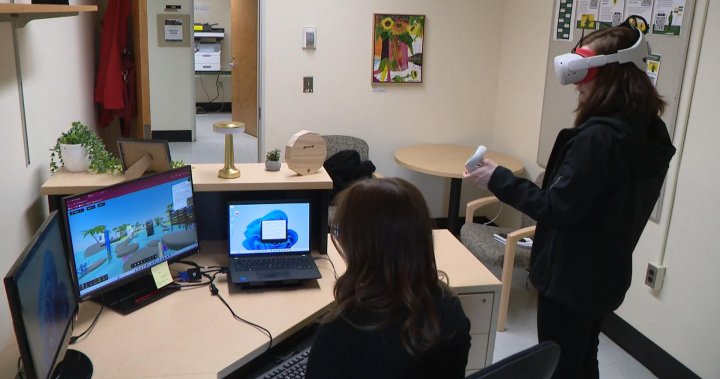Two graduate students at the University of Saskatchewan, Kristin Moskalyk and Nicole Lamoureux, created a virtual world to educate people in the Prairies about sustainability, particularly focused on the oceans. The project was developed during a course centered around teaching sustainability through technology, as they recognized that many students in the Prairies are landlocked and may have never visited the ocean. They presented their virtual reality metaverse at the United Nations Science, Technology and Innovation Forum as “techy teachers,” giving delegates a tour of their creation. The project placed in the top 15 out of 257 groups, impressing assistant professor Paula MacDowell with its high level of student engagement and the opportunity it provides for students to experience being global citizens.
The virtual world created by Moskalyk and Lamoureux allows students to explore issues related to plastic pollution, marine life, and sustainability in a unique and interactive way. This experiential learning opportunity is seen as a valuable tool for teachers to engage students and expand their understanding of global environmental challenges. MacDowell emphasized the importance of using technology for good and connecting with others through innovative educational approaches. She hopes that more teachers and students will take advantage of different media, technology, and AI content creation tools to create engaging learning experiences for students.
Moskalyk expressed the hope that teachers will utilize the virtual reality resource available through Frame VR online in their classrooms and advocated for the provision of more virtual reality headsets in schools. She emphasized the importance of educators being innovative in their approaches to teaching and creating engaging opportunities for students. By incorporating technologies that connect us and promote learning about each other, Moskalyk believes that educators can have a significant impact on the way students engage with and learn about complex global issues.
Overall, the creation of the virtual world by Moskalyk and Lamoureux represents a significant step in engaging students in experiential learning about sustainability and environmental issues related to the oceans. The project’s success in the United Nations competition highlights the potential for technology to be used in meaningful and innovative ways in education. By providing students with immersive experiences in the virtual world, educators have the opportunity to expand students’ understanding of global challenges and cultivate a sense of global citizenship. The hope is that more teachers and students will embrace technology and utilize it for educational purposes to create engaging and impactful learning experiences.













